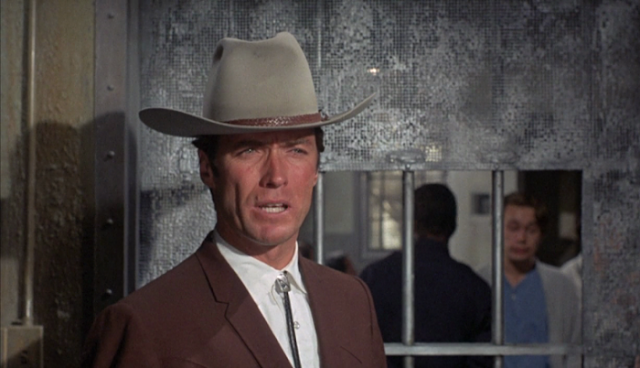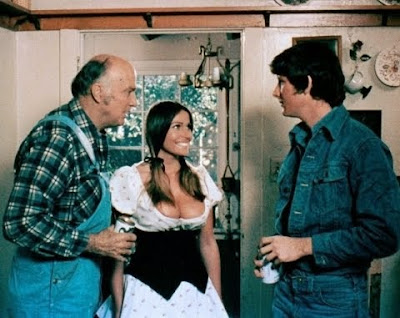Coogan's Bluff
Since my recent move I've rejoined the mainstream of American culture and once again have cable TV. Most of my viewing time consists of 5-10 seconds on each channel as I flip around. You could call it a guy cliche to do such a thing, but it usually doesn't take me long to recognize crap. Despite multitudes of channels, often this sort of surfing reveals only a wasteland. And endless Law & Order re-runs.
However, to my surprise, the Encore movie channels are included in the extended basic cable package (also: IFC, Sundance, and Flix). All films uncut for content and commercial free. One of the great things about these channels is that they run films that are obscure and/or not available on DVD. 1968's COOGAN'S BLUFF is neither, though it is not necessarily one you think of when you survey the career of Clint Eastwood.
Walt Coogan is an Arizona sheriff who says little and gets his man by any means possible. Warrants, probable cause, Miranda rights, not necessary. In an effective opening scene, he apprehends an American Indian hiding in the desert who had killed his wife. En route to jail, Coogan stops at his girlfriend's house for an assignation, bounding his quarry to a column on the front porch while he, um, takes care of other business. Coogan's superiors happen by and find the prisoner singing the blues while tied up. They bust in the house and dress down Coogan (who is in the bathtub) for his blatant disregard for the law and unorthodox behavior. "That's a man out there, not an animal!" This scenario should sound familiar to Eastwood fans, particularly reminiscent of a certain character the iconic actor would go on to portray in the 70s and beyond.
The superiors also inform Coogan that he is to fly to New York City to bring back James Ringerman (Don Stroud), a hippie who killed someone in Arizona and fled. Here begins a classic "fish out of water" story you have seen perhaps many times. No nonsense, "get it done" small town cop outsmarts more sophisticated big city men in blue on their own turf. There will be culture shock for all concerned.
What makes COOGAN'S BLUFF worth a few hours' viewing? Eastwood gets to try out his classic lawman persona, immortalized in the DIRTY HARRY and other later films. His Coogan immediately clashes with NYC cops, especially Lieutenant McElroy (Lee J. Cobb), who wearily explains that Ringerman is currently residing in a mental hospital and getting him released requires a lot of red tape that could take weeks. Cue the patented Eastwood eye squint.
Soon, Coogan uses his own methods to spring the perp, only to be ambushed by Ringerman's girlfriend, Linny Raven (Tisha Sterling) and an accomplice (David Doyle, later of Charlie's Angels ) at the airport. They steal his firearm. After recovering in the hospital, Coogan tracks Linny down at an ultra psychedelic nightclub called the Pigeon Toed Orange Peel (where filmstrips of naked women and tranatulas play on the walls and live naked women sit on a trapeeze), spends the night with her (Eastwood's characters are almost James Bondian in their libido), then again is ambushed after she brings him to a pool hall where several cohorts are waiting. We are then treated to a Clint vs. at least seven creeps wielding cue sticks. There's also a fine motorcycle chase finale.
For a 1968 film, COOGAN'S BLUFF is pretty violent. Director Don Siegel, who worked with Eastwood several times, directs with force and economy. He's almost like Hemingway in his conciseness. It's easy to see how Siegel influenced his star when the latter directed his own films years later.
Along the way, Clint also woos a probabtion officer named Julie (Susan Clark, looking very lovely) who happens to have Linny as one of her parolees. Various things happen through the course of the movie to prevent a consummation of their sexual tension.
COOGAN'S BLUFF benefits from generous amounts of humor, some dated, some very un-PC. There's a running gag as everyone thinks the cowboy hatted Coogan is from Texas instead of AZ. There are roughouse gags (the encounter with "Wonderful Digby" at the club), the socially observational digs (the little old lady at the stationhouse who reports that everyone is trying to rape her), and the regional jokes (a cabbie charges Coogan fifty cents extra for his luggage [he's merely carrying a briefcase], then a hotel clerk charges him extra because he does not have any luggage.)The timing of some of the funnier bits is more deft than many of the so-called comedies of the same period. Clint also gets to utter at least one great line, "You better drop that blade, or you won't believe what happens next, even while it's happening."
Don't think about the plot too hard. Don't arrive at the end of COOGAN'S BLUFF and survey what just happened, how everything could've been avoided if...just enjoy. If you're an Eastwood completist, this a must.



Comments